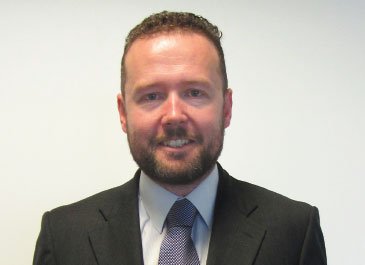"The days of individual genomic tests will end soon"
October 22, 2014 | Wednesday | Interviews | By BioSpectrum Bureau
"The days of individual genomic tests will end soon"
director, Business Development, Reagent Products, Horizon Discovery Group PLC
Dr Burke, who has a strong background in functional genomics and gene editing and
is currently focusing on reference standards for molecular diagnostics as well as high value bioproduction cell line platforms, shares his views on new age platforms.
Cancer diagnostics through mutational analysis and gene expression profiling is being touted to be the next major breakthrough area in clinical practice. Can you share your views on what some of the future directions or trends in this area?
The days of performing individual genomic tests is coming to an end. There is likely to be greater panel based or exome testing, increasing the number of biomarkers that
can be interrogated in a single sample. This is important as samples generated from biopsies are finites, so this is a more effective use of patient specimens. Importantly we are seeing the development of increasingly sensitive techniques that could allow identification of biomarkers in the blood or urine. This would allow earlier detection of cancers, possible pre-visualisation of the tumour and presents the possibility of monitoring the disease to ensure alignment of therapeutic solutions.
How does genomics play an important role in Cancer diagnosis?
Cancer is not one disease. Even in a person with cancer it's rarely a single disease. Each cancer is made up of different genetic variations, many of which are somatic and therefore occur during life rather than being inherited. Genomics allows us to decode each tumor and to apply the most effective treatment. Given both the cost and potential toxicity of giving an ineffective treatment, genomics
is increasingly centre stage in oncology.
How does Horizon's Genesis platform aid in early cancer detection and diagnosis?
Horizon's molecular reference standards are currently used as external controls to determine specificity and sensitivity of molecular diagnostic tests. They are also
used by proficiency schemes who provide accreditation to many labs to confirm the ability and competency of that lab in detecting particular cancer genotypes. Further work is ongoing at Horizon to explore the development of products which would support minimally invasive testing (blood or urine).
Can cancer be detected at early-stages using genomic tools?
The potential definitely exists to detect cancer prior to the formation of a tumor which is detectable by traditional methods. Blood or urine would be the likely analytes but these pose different technical challenges, including the need for lower limits of detection.
Can genomics tools be used to predict cancer inheritance?
Yes, there are various predictors of cancer such as BRCA. However most cancers are driven by somatic (sporadic) mutations which are not hereditary.
What is your India strategy as while some of the leading products can be sold to private Indian hospitals, most public hospitals will require simpler, portable, easy-to-use and more affordable versions?
We do not sell diagnostics. We sell references standards and develop controls for companies that design and market diagnostics. We recognise the importance of accuracy, precision and affordability of our product in supporting the push to beat cancer. Ultimately it comes down to getting the right drug, to the right patient at the right time based on the right test from a diagnostic result.
Are there a lot of innovations in this area and how do you see the landscape?
NGS is a big driver and then the gradual movement to minimally invasive approaches such as detecting biomarkers in blood or urine. Informatics is a big challenge as we try to bring together all the scientific and patient data to ensure the best decisions are made. Treating cancer in my opinion is going to become a multi-disciplinary affair to a greater extent than it is currently... The ultra high-end tests in general are perceived by consumers as very expensive.
Are such tests affordable to various strata of patients in countries like India?
The model for personalised medicine is still maturing. Platforms such as NGS will drive the cost of diagnostics down. The model for drug discovery will evolve to be
more successful supported by the underlying personalised medicine framework. It's going to take time but simply put, base on finite funds, the economics of treating
cancer needs to improve.
How do you view the opportunities in India in specific and Asia in general?
Very important. You have large populations. The incidence of cancer is rising and importantly there are some variations that seems to be specific to different ethnicities. We need to ensure we have the right data, the right drugs and reasonable expectations to meet these challenges.
What are some of the key challenges that you have noticed in the Indian markets/scientists?
The infrastructure is a challenge. However I don't see this as rate limiting. I feel that many of the pathologists and oncologist in India are more discerning about adopting new technologies just for the sake of doing something different. Given the state of health economics around the world, I think this is a sensible take.
What do you think will be the game changers?
NGS with better error rates, improved drug discovery success rate and minimally invasive testing.









